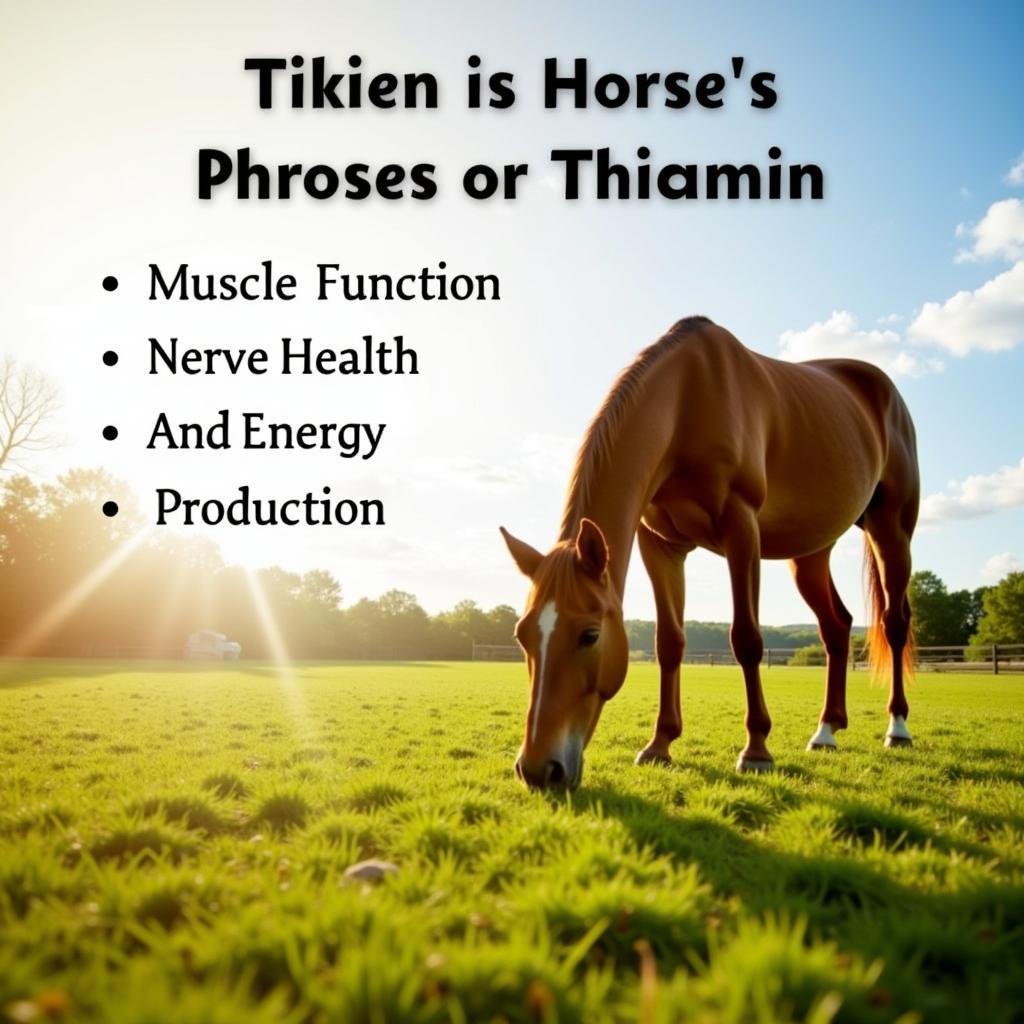Thiamine B1 is an essential vitamin for horses, playing a crucial role in their overall health and well-being. This guide will delve into the importance of Thiamine B1 For Horses, its benefits, deficiency symptoms, and supplementation strategies.
 Thiamine B1 Benefits for Horses
Thiamine B1 Benefits for Horses
Understanding the Importance of Thiamine B1
Thiamine B1 is a water-soluble vitamin, meaning it isn’t stored in the body and needs to be replenished regularly through diet. It is crucial for carbohydrate metabolism, converting carbohydrates into energy that fuels your horse’s daily activities. Thiamine B1 is also essential for proper nerve function and muscle development. A deficiency in this vital nutrient can lead to a range of health issues, affecting your horse’s performance and overall health. You might want to consider adding a B complex for horses to their diet.
Signs of Thiamine B1 Deficiency in Horses
Recognizing the signs of thiamine B1 deficiency is vital for early intervention and preventing more serious health complications. Some common symptoms include:
- Loss of appetite
- Muscle weakness and tremors
- Incoordination and stumbling
- Lethargy and depression
- Weight loss
- Increased heart rate
If you observe any of these symptoms in your horse, consult with your veterinarian immediately to determine the underlying cause and develop an appropriate treatment plan. Early detection is key to successful management and recovery. A good horse appetite stimulant can also be helpful during recovery.
Thiamine B1 Supplementation for Horses
While horses typically obtain sufficient thiamine B1 from their diet, which should include quality oats for horses, certain factors can increase the risk of deficiency. These include:
- High-grain diets
- Intestinal disorders
- Strenuous exercise
- Certain medications
In such cases, your vet may recommend thiamine B1 supplementation. Supplements are available in various forms, including injectable solutions, oral powders, and pastes. The dosage and duration of supplementation will depend on your horse’s individual needs and the severity of the deficiency. Sometimes, horse supplements for energy can also be beneficial.
What are the Benefits of Thiamine for Horses?
Thiamine plays a crucial role in a horse’s neurological health, muscle function, and energy metabolism. Adequate thiamine levels contribute to improved coordination, reduced muscle fatigue, and better overall performance.
“Thiamine is often overlooked, but it’s a fundamental nutrient for equine health,” says Dr. Emily Carter, DVM, specializing in equine nutrition. “Ensuring your horse receives adequate thiamine can significantly impact their well-being and athletic ability.”
How Much Thiamine B1 Does a Horse Need?
The specific thiamine requirement for a horse varies based on factors like age, activity level, and overall health. Always consult with a veterinarian to determine the appropriate dosage for your horse, as excessive thiamine intake can have adverse effects.
“Never underestimate the power of proper nutrition,” adds Dr. Carter. “A balanced diet, sometimes supplemented with essential vitamins like thiamine, is the cornerstone of a healthy and happy horse.” You might also consider adding vita calm for horses to help maintain their overall wellness.
Conclusion
Thiamine B1 is a vital nutrient for horses, supporting various bodily functions, from energy production to nerve function. Understanding the importance of thiamine B1, recognizing deficiency symptoms, and implementing appropriate supplementation strategies are crucial for maintaining your horse’s optimal health and performance. Always consult with your veterinarian for guidance on thiamine supplementation and ensuring your horse receives the proper care they need.
FAQ
- Can I give my horse human thiamine supplements?
- What foods are rich in thiamine for horses?
- Are there any side effects of thiamine overdose in horses?
- How long does it take to see improvements after starting thiamine supplementation?
- Can thiamine deficiency be prevented in horses?
- What is the connection between thiamine and equine neurological disorders?
- Is thiamine supplementation necessary for all horses?
Scenarios where Thiamine B1 Deficiency is Common
- Racehorses on high-grain diets
- Horses with digestive issues hindering nutrient absorption
- Elderly horses with compromised metabolic functions
Related Topics:
- Equine Nutrition
- Vitamin Deficiencies in Horses
- Horse Health and Wellness
Need support? Contact us 24/7: Phone: 0772127271, Email: [email protected] or visit us at QGM2+WX2, Vị Trung, Vị Thuỷ, Hậu Giang, Việt Nam.